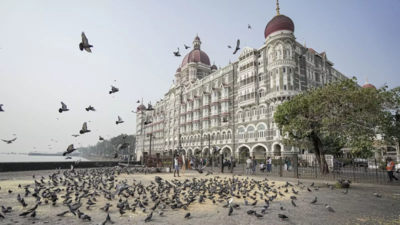
NEW DELHI: Sixteen years have passed since the devastating Mumbai terror attack of 2008, an incident that continues to affect numerous survivors. Devika Rotawanwho survived the 26/11 Mumbai terror attack and served as a key witness identifying terrorist Ajmal Kasab during the trial, experienced a life-altering change.
Devika was only nine when she was caught in gunfire at Chhatrapati Shivaji Maharaj Terminus (CSMT) on November 26, 2008. She sustained a bullet wound in her leg, which still causes her discomfort, particularly during winter.
In a conversation with PTI on the 16th anniversary of the 26/11 attacks25-year-old Devika expressed the indelible nature of that night’s memories.
“It’s been 16 years, but I can still remember what I was doing, where I was going, and how the attack happened,” she said. She recounted travelling to Pune with her father and brother on November 26, 2008, to meet her elder sibling.
“We had just arrived at CSMT from Bandra when a bomb blast occurred, followed by a barrage of gunfire. People of all ages were badly injured,” she said.
Initially taken to St George’s Hospital with other victims, Devika was subsequently moved to JJ Hospital due to the overwhelming situation. There, she underwent surgery for bullet removal.
“I was unconscious for a while,” she said, noting her recovery lasted over a month. Post-discharge, Devika returned to Rajasthan, though the incident’s impact persisted. When approached by Mumbai Crime Branch about testifying, her family readily agreed.
“We agreed because both my father and I had seen the terrorists, and I could identify Ajmal Kasab, the man who caused so much pain,” Devika added. Her testimony proved vital in Kasab’s trial and subsequent conviction.
“I wanted to kill him, but I was just nine. I could do nothing but identify him in court,” Devika recalled, noting that Kasab’s memory, the lone surviving terrorist, remains with her.
Having lost her mother in 2006, Devika aspired to become an officer to combat terrorism. “Terrorism should be eradicated. People must speak out against the wrongdoings in our society. It all starts from Pakistan, and that must be stopped,” she said, acknowledging the Indian government’s professional handling of such situations.
Despite receiving support from many, some relatives distanced themselves after the incident, though they’ve recently resumed contact. Currently, Devika continues her physical recovery whilst maintaining her determination.
“I still feel pain in my leg, and sometimes it swells during the winter, but I am proud that I stood up for what was right. People should come forward and stand with victims,” she added.
Approaching the 26/11 anniversary, she encouraged public remembrance of victims and unity against terrorism. “Terrorism must end, and people must remember what happened on that night. We need to stand with the victims,” Devika added.
A graduate now, Devika resides in rented accommodation in Bandra east.
The Bombay High Court instructed Maharashtra’s government to consider her request for EWS housing allocation with sensitivity. She received an initial compensation of Rs 3.26 lakh, similar to other survivors.
Former chief minister Devendra Fadnavis assisted with Rs 10 lakh for medical treatment, she noted. Though allocated housing, Devika awaits possession.
On November 26, 2008, ten Pakistani terrorists arrived by sea, initiating indiscriminate attacks that killed 166 people, including 18 security personnel, injured many others, and caused extensive property damage. Notable casualties included ATS chief Hemant Karkare, Major Sandeep Unnikrishnan, Additional Police Commissioner Ashok Kamte, and Senior Police Inspector Vijay Salaskar.
The attack, beginning November 26, 2008, continued until November 29, targeting locations including Chhatrapati Shivaji Maharaj Terminus, Oberoi Trident, Taj Mahal Palace and Tower, Leopold Cafe, Cama Hospital, and Nariman House Jewish Community Centre.
Security forces eliminated nine terrorists. Ajmal Kasab, captured alive, was executed on November 21, 2012.



















